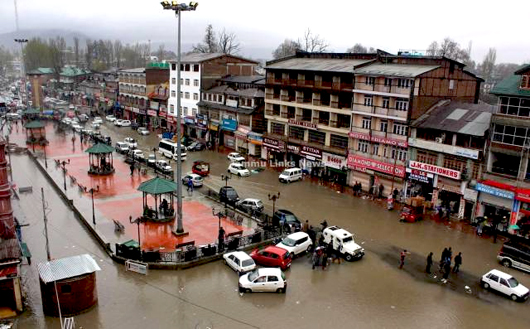Srinagar, Mar 30: Jhelum river crossed danger level in Srinagar and Sangam area of south Kashmir on Monday with heavy rains lashing most parts of the state which sounded a flood alert asking people to move to safer places.

A senior official said water level of river Jhelum at 6 AM on Monday at Sangam (South Kashmir) and Ram Munshi Bagh (Srinagar city) has touched 22.4 feet and 18.8 feet respectively. Danger level at Sangam is 21 feet and at Ram Munshi Bagh it is 18 feet.
The alert was issued by the government after water level rose rapidly in the Jhelum river due to incessant rain over the past 24 hours.
Chief minister Mufti Mohammad Sayeed flew in from Jammu to take stock of the situation, schools and college exams scheduled for Monday and Tuesday were cancelled and control rooms set up in the Valley. The metrological department said there was no fear of floods but issued an avalanche alert for upper reaches.
“The entire administration is on alert,” Kashmir divisional commissioner Gazanfar Hussain said.
The CM asked the army, which led the relief and rescue operation the last time, to provide men and machinery to the administration for effectively countering the situation.
Hundreds of residents in Pulwama and Srinagar districts shifted to safer locations. Several areas in south Kashmir’s Shopian and Kulgam were cut off after flash floods washed away bridges.
Kashmir has been witnessing heavy rainfall since Saturday, leading to sudden rise in water levels of rivers, streams and rivulets.
Several houses were damaged in Budgam in central Kashmir, where 221 families were moved to higher planes. Fifteen more families were evacuated elsewhere.
In the state capital of Srinagar, fear was palpable in the commercial hub of Lal Chowk, which was wrecked in September floods, the worst to hit the Valley in 100 years that left 200 people dead. Water-logging and rising levels of the Jhelum river forced businessmen to move out merchandise. Dozens of residents shifted to higher planes.
“We have decided to shift from our house and cleared shops of goods,” Firdous Wani, a local trader, said.
The water level in the Jhelum crossed 16 feet at the Ram Minshibagh gauge at 10pm -- the danger mark is 18 feet -- while at Sangam it crossed 18 feet, as against danger mark of 23 feet. Authorities raised the alarm level to orange, which signals flood alert.
A swollen Jhelum had wrecked havoc in the summer, washing away homes and businesses, many of which remain close till date. The Jhelum suddenly rose to 14.20 feet, just four feet below danger mark, at Srinagar’s Ram Munshi bagh. Like the last time, those living close on its banks moved to the top – mostly third – floors of their homes.
“All emergency services have been pressed into service to meet the eventuality of a flood,” Srinagar deputy commissioner Farooq Ahmad Lone said.
He advised people living along the banks of Jhelum to remain vigilant and shift the elderly and children to safer places.
The meteorological department said rain would continue till April 4 but downplayed flood fears. “Another western disturbance, though weaker, is likely to hit on April 2. I don’t think we are facing flood situation (like September). Though mountain streams can cause landslides,” meteorological department director Sonum Lotus.
He also warned of heavy rain at some places with snow in the higher reaches during the next 12 hours. A four-member ministerial team has been asked to stay put in the Valley.





Comments
Add new comment